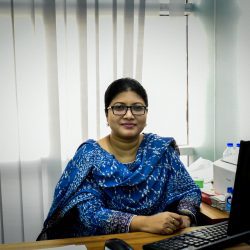Sabrina Nourin, BRAC University (Bangladesh)
Research Project Title: Role of Intersectionality in Empowering Marginalized Women via Entrepreneurship
In recent years, entrepreneurship has emerged as a powerful avenue for economic empowerment, particularly among marginalized women in the context of Bangladesh. However, within this dynamic realm, a critical but often overlooked factor plays a pivotal role in shaping their experiences and opportunities: intersectionality. The intersection of gender with other identity factors, such as strong patriarchal norms, resource accessibility and support system in terms of economic activity, creates a complex web of challenges and advantages that profoundly influence marginalized women's entrepreneurial journeys. This research will delve into the multifaceted landscape of intersectionality, aiming to uncover how it both empowers and presents obstacles for marginalized women in entrepreneurship. By examining the intricate interplay of identities, experiences, and strategies, this study seeks to contribute to a deeper understanding of how entrepreneurship can serve as a catalyst for empowerment within diverse and inclusive contexts.
The aim of this research is to investigate how intersectionality, involving gender, and socioeconomic status, and other identity factors, shapes the entrepreneurial experiences, challenges, and empowerment of marginalized women. We seek to understand the nuances of these intersections and identify strategies for harnessing intersectionality to empower marginalized women in their entrepreneurial endeavors.
We are targeting to answer below two questions -
How do intersectional identities influence the entrepreneurial experiences of marginalized women?
How can intersectionality be harnessed as a source of empowerment for marginalized women in entrepreneurship?
We will conduct 12 Semi structured interviews and 3 FGD with a diverse group of marginalized women entrepreneurs from rural parts of Bangladesh who are engaged in agro-business to gather qualitative insights into intersectional dimensions of their entrepreneurial experiences. We will encourage participants to share narratives of their experiences. Data will be analyzed through using thematic analysis to extract themes and patterns from interview transcripts. We will explore how intersectionality shapes experiences, challenges, and strategies employed by marginalized women entrepreneurs.
